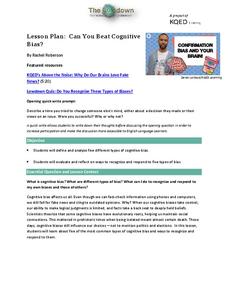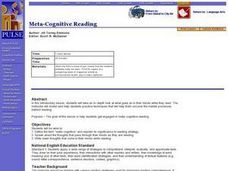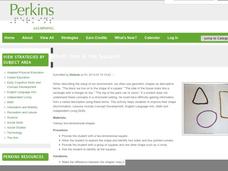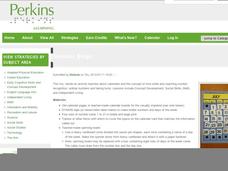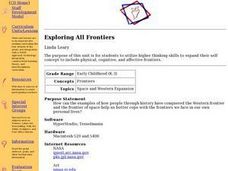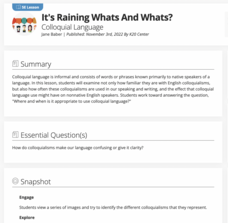Perkins School for the Blind
Following Directions
Turn the act of following directions into a fun and engaging game! Especially designed for students with cognitive or intellectual disabilities, this lesson uses a game format as a natural reinforcer. Write a set of directions onto a set...
NPR
Can You Beat Cognitive Bias?
In a time of fake news, media manipulation, and Internet trolls, a resource equips learners with the tools they need to recognize and combat resources that are designed to appeal to our cognitive biases. Introduce learners to five...
Curated OER
Meta-Cognitive Reading
Students define the term "meta-cognitive" and explain its significance to reading strategy. They speak aloud the thoughts that pass through their minds as they are reading and write down thoughts that come to their minds while reading.
Perkins School for the Blind
Treasure Hunt
On, over, and under are some very common prepositions; but how can you teach these concepts to children with visual impairments? Here, is one way. Kids will practice following verbal commands as they go on a classroom treasure hunt. They...
Perkins School for the Blind
Silly or Sensible?
Is it silly or sensible? That's a great question, and it's the question that will drive this entire instructional activity. Learners with special needs and visual impairments work together to analyze verbal information. The instructor...
Perkins School for the Blind
What Would You Do If...?
What would you do if...? That's a great question, and, when posed to learners with visual impairments, a question that can foster concept development and speaking and problem-solving skills that relate to real-life situations. The...
Perkins School for the Blind
Mix and Match
Sorting and matching are skills that have all kinds of applications. Learners with low, but useable vision work to match an object to an object, an object to a picture, and a picture to a picture. This will help them identify objects...
Perkins School for the Blind
Which One is the Square?
Children who are blind need to constantly be engaged in building conceptual understandings of the world around them. This activity will help them grasp the concept of shape, identify shapes, and consider shapes as they are used to...
Perkins School for the Blind
Where Shall I Put It?
Position and positional phrases are concepts that need to be constructed for learners with low or no vision. Help them gain competence and a conceptual understanding of words like on, in, and under with a funny game. After gathering a...
Perkins School for the Blind
Calendar Bingo
While this activity was designed for students with special needs, it could be used with any group learning about the calendar or days of the week. Old calendar pages become the bingo board, and numbers 1 through 31 become the numbers...
Curated OER
The Brain: Control Central
Students investigate the brain as the organ that regulates all of their physical, emotional, and cognitive responses. Some of the components of mental illness are examined inn this lesson.
EngageNY
TASC Transition Curriculum: Workshop 8
Lights, camera, action! Math educators consider how to improve their instruction by examining a model of the five-practice problem-solving model involving a movie theater. Participants examine cognitive demand in relation to problem...
Perkins School for the Blind
The Country Egg
Because most children with visual impairments don't reach and grab things at a young age the way sighted children do, they need additional supports to build up their fine motor skills. Here, they work on the pincer grasp, using their...
Perkins School for the Blind
Beanbag Toss
Why is learning how to catch and toss so important? If one has visual impairments, learning this basic skill will help him increase orientation and mobility, coordination, and cognitive development,. Mastery of this skill will also mean...
Perkins School for the Blind
Student Store
Vocational training activities are extremely important for learners with intellectual or physical disabilities. Here is a great idea that will help your class become skilled at money handling, basic economic concepts, interpersonal...
Curated OER
Exploring All Frontiers
Young scholars utilize higher thinking skills to expand their self concept to include physical, cognitive, and affective frontiers. The teacher create activities which allow students to use raw data and primary sources, as well as...
Curated OER
I Am What I Think I Am!
Learners study conative and cognitive strengths through characters in literature. In this conative and cognitive strength instructional activity, students read about a favorite character or historical person. They make a chart of the...
Curated OER
It's All in Your Mind
Learners recognize diminishing cognitive abilities. affect independence. In this health lesson, students explore the struggles older people have so to their diminishing cognitive abilities.
Curated OER
Understanding and Supporting Our Peers with Cognitive Challenges
Students explore different federal laws promoting the education for the handicapped. In this literacy lesson, students brainstorm how they can help individual with Down syndrome. They read a fiction book related to the topic and discuss...
Curated OER
Human Growth and Development in Middle Adulthood
Students identify the differences between the transition model and the crisis model of midlife, and the myths associates with the latter. They describe cognitive and physical continuity and change in middle adulthood. Studnets compare...
Down Syndrome Possibilities
Down Syndrome: Lesson Plan
You don't usually find lessons written just for learners with Down syndrome, so this is a true jewel. Kindergartners will explore farm animal sounds and identification as they sing the song, "Down on Grandpa's Farm." They sing the song,...
K20 LEARN
It’s Raining Whats and Whats? Colloquial Language
"Yuns betta outten the lights!" Colloquial language is the focus of a lesson that asks middle schoolers to consider the pros and cons of using idioms. They read articles, match expressions with their meaning and place of origin, and...
Curated OER
Leaf Arrangement: Kinetic Cognitive Connections
Students use critical thinking to identify leaf patterns. In this problem solving activity, student compare leaf patterns by "acting out" the positions and structures they see. This is a kinetic lesson where concepts are attained through...
Curated OER
Teaching to Enhance Development and Learning
Pupils engage in a lesson that prepares Preschool Teachers to teach lessons targeted at the development of children in the area of learning. They view a PowerPoint presentation to obtain the new information and the visual learning is...
Other popular searches
- Piaget Cognitive Development
- Meta Cognitive
- Cognitive Development
- Cognitive Responses
- Cognitive Domain
- Cognitive Model
- Cognitive Psychology
- Cognitive Lesson Plans
- Cognitive Strategies
- Cognitive Perspective
- Meta Cognitive Reading
- Cognitive Disorders



